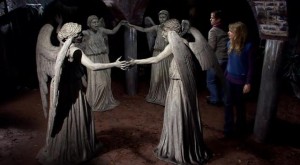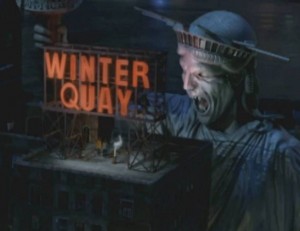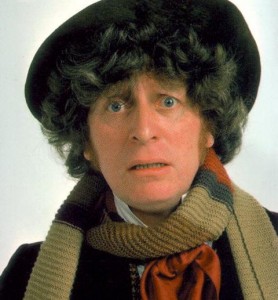Bad Fan Sam
Oct.28, 2012, filed under Reviews, television
![]() I want to talk Who.
I want to talk Who.
But first I want to remind everyone that I am a Bad fan. I don’t just love the things I love: I hold them to high standards, and am willing to express my disapproval when they fail to meet them, because the high standards are what made me fall in love with them in the first place. I don’t like falling out of love with things. It makes me sad.
You see, there are three kinds of writing that I class as good. There is the writing that makes me want to read more by that author. I enjoy it, it entertains me, it serves its purpose of allowing me to escape for a while. Some of those works become old friends, and it doesn’t matter that I could practically quote them word for word: I still derive pleasure from reading them. Terry Pratchett and Robert Rankin are authors in this category. Then there is work that I admire for its prose or its bravery, its experimentation or poetry, its language or ideas. I will read it, admire it, then put it away and probably never come back to it. Flann O’Brien, James Joyce and Iain M Banks all write like this.
Then there is the really good stuff. Writing that inspires me. Writing that inspires me not only to read but to write. Roger Zelazny, Alfred Bester, Margaret Atwood, Octavia E Butler, Tim Powers, Iain Banks and Kim Stanley Robinson have written works that I have read and re-read and dreamed secret and not-so-secret dreams about being able to write that well — not like them, but as well as them. Kim Stanley Robinson inspired me not only to write but to pursue environmental science. Alfred Bester made me think that it’s possible to turn synaesthesia into literature. Zelazny showed me how to make literary science fiction exciting. Atwood and Butler demonstrated that it’s possible to write about otherness without losing the connection with humanity. Powers taught me that a writer can repeat a plot without writing the same story (to be fair, so did Moorcock, but he didn’t have the prose of Powers). Iain Banks showed how to pack oodles of story into sparse text.
These writers inspired me, and I don’t care what genre or medium in which someone writes, part of a writer’s job is to inspire others to write. Part of a writer’s job is to do it properly. Someone who is being given a huge platform for his or her work has a responsibility to write to a high standard, because it’s on show, and it’s going to demonstrate to a new generation of content-producers what makes good work.
And I’m sorry, but recent Who has fallen down very badly in that regard. If I had written any one of those stories and submitted it to either of my crit groups, I fully expect they would, quite rightly, have ripped it to shreds.
Plenty of people have had a go at Asylum of the Daleks — just typing out the title makes me laugh in a sad, despairing way. I can’t bring myself to go over the awfulness that was this episode. It had two lines, only two, that were of any value:
“You think hatred is beautiful?â€
“Perhaps that is why we have never been able to kill you.â€
The rest of it, short of a decent performance from Jenna Louise Coleman, was a mass of plot holes and hand-waving that we’re supposed to forgive because it’s Doctor Who and it was bombastic and full of SPECIAL EFFECTS and DRAMA.
Chris Chibnall picked up the baton and managed to make me like Pond for a whole episode. He does pull it out of the bag every so often — I also liked 42, from back when RTD was at the helm, although I didn’t rate the Silurian episodes from Series 5 all that much. Dinosaurs on a Spaceship was probably the best of the recent episodes: rampant silliness that didn’t take itself too seriously and had enormous amounts of fun without trying too hard.
I haven’t liked any of the Toby Whithouse episodes, and A Town Called Mercy was no exception. A big deal was made out of the Doctor picking up a gun, but only in interviews about the episode. In the episode itself it was hardly a big deal. Yet I think back to The End of Time and the Doctor refusing to pick up a gun for anything. He is the ultimate paradoxical pacifist, and the watering-down of this absolute stance has given rise to endless frustration of late. Is this what happens when writers of a British series try to tailor their output to a more American market? I don’t know, but I don’t like it.
Sentimentality took hold for the next couple of episodes. I’ll skip The Power of Three because Chibnall didn’t fulfil the brief of “life with the Doctor” nearly as well as Gareth Roberts did in The Lodger and it was all a bit… Meh, really.
Angels Take Manhattan was the final episode and it committed what for me is a cardinal sin. It broke the previously-stated rules.
This is the problem I have with Moffat and the episodes he writes. If he wants something to happen in the plot then it happens, regardless of whether existing canon would allow it to or not. As an example, the Weeping Angels. Anyone remember why they were weeping? Because they had to hide their eyes so as not to look at each other. If they looked at each other they were stuck. THAT’S HOW THE DOCTOR SAVED SALLY SPARROW.
Blink was one of the best episodes of the 10th Doctor’s run, but Moffat has ruined it by changing how the Angels work. He did this way back, when he covered the inside of a massive spaceship with Angels and had them attacking en masse without so much as a blindfold to share between them. In this most recent episode he had our heroes trapped in a corridor by an Angel at either end — by earlier rules those Angels should have been trapped by each other, but no. And it got worse:
Am I supposed to believe that no one saw the Statue of Liberty get up and walk? Or maybe the automatic quantum lock doesn’t work on anything over 3m tall. Who the fuck knows?
And there was all that nonsense about how reading something written down fixes it in time. Time can be re-written, except if you read about it, apparently. But canon established, in The Waters of Mars, that text can rewrite itself if the Doctor interferes. He did it already. We watched the words change.
Moffat obviously has some over-arching concept of how the written word affects the Doctor’s timeline and his ability to change his past, his future, his present. River Song’s catchphrase —”Spoilers!”— has a whole other significance if reading something means it can’t not happen. But this is new. This is not how it worked before. And I’m sorry, but you can’t just rewrite the rules of how a world works to suit yourself; not without some form of justification or explanation. It’s unprofessional, in my opinion. If you are given the job of working with an established set of characters and the universe they live in, you work with those characters and that universe — you don’t go changing things because the rules make the stories too hard to tell. It’s the writer’s job to come up with ways to make the stories work within the rules of that world, or accept that the story needs to be told in a different world, with different characters.
Doctor Who has a huge audience. There are kids out there learning how to tell stories by watching it. I want them to learn how to tell good ones, and not to expect to get by on the cult of celebrity. Being famous and successful shouldn’t mean getting away with work that isn’t as good as that being produced by people still trying to make it. Those who are least successful have to work the hardest at being good in order to achieve success: it’s kind of insulting to think that success means forgetting all about plot structure, character motivation and consistency.
I am falling out of love with Doctor Who.
Sadface.





November 1st, 2012 on 21:09
“And there was all that nonsense about how reading something written down fixes it in time. ”
My pet grudge with this is (the classic)….
Just because you read it doesn’t mean it was true!
November 4th, 2012 on 18:28
I know! Especially something published as fiction!